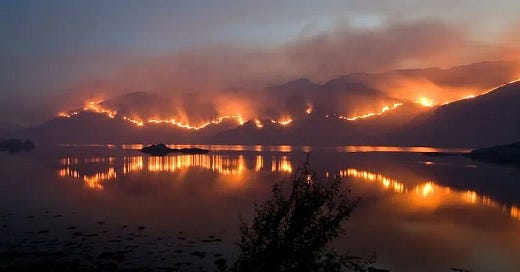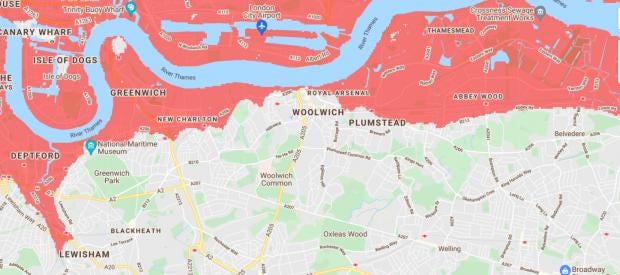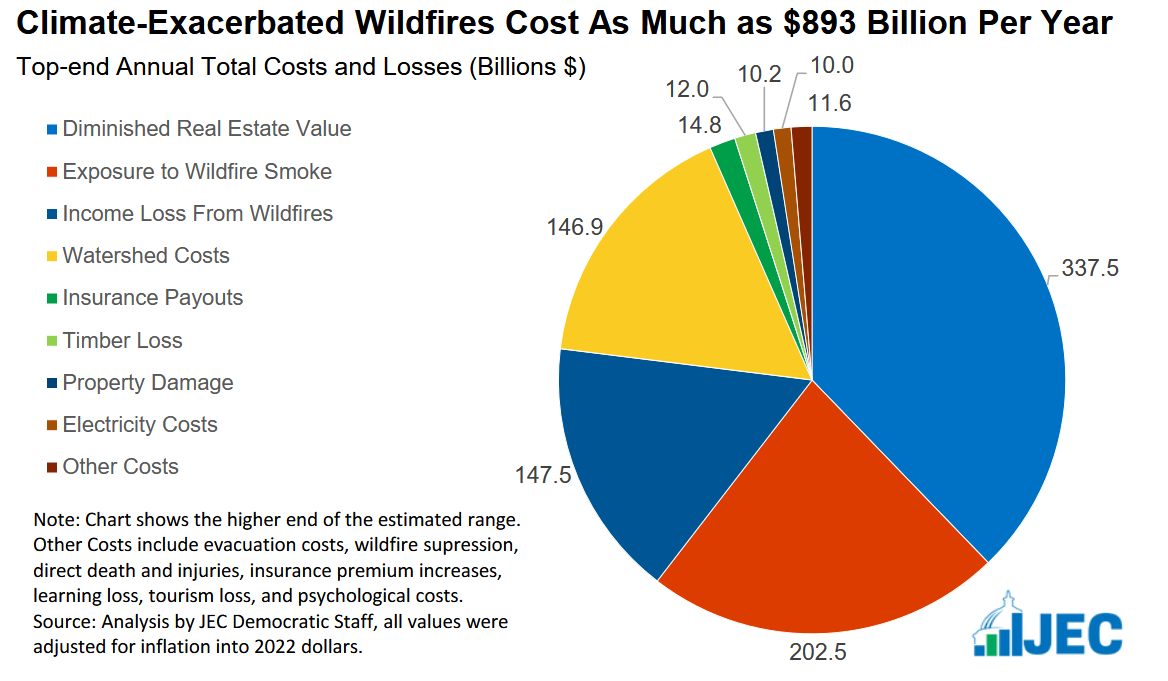Flee the cities! Capitalism is finished
Our economies contain the seeds of their own destruction and the seeds have germinated.
In general, we the people, have trouble judging risk. We tend to think that “it’ll” never happen to us, it’s someone else’s problem. I live in Brittany, an area known for it’s temperate and frankly damp climate, 2 years ago a wildfire burnt through the Monts d'Arrée. The same year high winds brought down thousands of trees damaging property, electricity and telephone cables. So far this year there have been 286 wildfires in the UK, a group of countries not reputed to be very dry and arid. The photo below is of a fire in Scotland.
The latest climate data and methodology updates to wildfirerisk.org, a free tool for understanding wildfire risks across the United States, reveal that over 115 million people—more than one-third of the U.S. population—live in counties with high wildfire risk.
Yes, you read that right, one-third of the US population, one in every three people.
We read about tornadoes, wildfires and other ‘natural’ disasters but very rarely about the following consequences. Nor the follow-on impacts. I, and others, have been pointing out for years that eventually nobody living in at-risk areas will be able to get insurance cover. No insurance equals no mortgage and so no house buying, no house buying means a collapse in the housing market.
Homeowners in the UK have nearly £6tn worth of equity in their homes, a collapse in the housing market means that this wealth will disappear bringing down the economy. This isn’t a wild idea, it’s already happening. Three of the four main insurers in California, State Farm, Farmers Insurance Group and Allstate, stopped offering insurance cover in the State in 2022. You can find figures for US insurance losses here
Within the Capitalist economies the only sector which seems to be taking climate change seriously is the insurance industry. For example Günther Thallinger, who sits on the board of Allianz SE, which is one of the world’s biggest insurance companies argues that climate change could bring about the end of Capitalism. He believes that Capitalism can adjust to save itself, an opinion which is debatable.
The insurance sector is one which gets hit by the consequences of other economic sectors. These latter sectors are, in the main, pulling back from their climate policies. For the most part they hadn’t really got on with the job anyway. These sectors rely on insurance and the insurance industry, it’s all linked together. For environmentalists it’s sort of fascinating that warnings coming from such an important sector of the Capitalist economies are ignored by the other sectors. Little wonder then that environmentalists and climate struggle groups are equally ignored. Günther Thallinger is pointing out that there is an existential threat to Capitalism itself, a warning which will go unheard by elected government leaders who spend their time worrying about economic growth.
The political playground is in uproar because some new bullies have arrived in school, armed with a big stick called Tariffs. The chatter around the playground is all about how these tariffs are going to hit economic growth and jobs, maybe they’ll bring on a recession. This has now taken centre stage and concerns about the climate are being set aside as governments gear up for a trade war. The neo-liberalism of Reagan and Thatcher is taking a hit, globalisation, based on the economic theory of comparative advantage, is being threatened. All of this within the context of a Capitalist system whose very existence is under threat. Said system has shown itself to be utterly ineffective at addressing the problems that it, itself, has created.
The house building industry continues to build houses that burn easily. Planning permission is still granted for housing zones in known fire and flood risk areas. Just one of the industries that is making things worse by continuing to put short-term profit ahead of people’s safety and well-being.
Cities
They are major players in the Capitalist economies, they are often described as the motors behind economic growth. According to this study urban productivity increases by about 5% to 6% with each doubling of city population. So bigger cities with more people equals more economic growth.
All around the world major urban areas are sinking at the same time sea levels are rising. A lot of urban expansion has been in high risk areas. Between 1985 and 2015, the world’s urban settlements grew by 85%, from 693,000 to 1.28 million km squared, so that by 2015, 11% of all settlement areas (145,000 km squared) were in zones with high or very high flood risk. Since 1985, about 36,500 km squared of newly urbanised land was added in locations with inundation depths of over 1.5 meters during severe floods – equivalent to 23 times the area of Greater London. The study stopped at 2015, a decade ago and a decade that has seen things get worse.
The Mayor of Paris is working to produce ‘crisis guidelines’. She wants the citizens to train to be ready for floods, fires and extreme heat. Similar in many ways to the ‘in the event of a nuclear attack, hide under the table’ advice given a few decades ago. Based on NASA data a flood map was released in 2021, it shows that by 2030 the London areas of Lewisham, Greenwich and Bexley will be regularly flooded, Dartford could very well disappear.
Another existential threat to Capitalism? It’s definitely going to make life miserable for millions of people as they see their houses flooded, again and again. Climate change also means that cities will get hotter, we are shooting past 1.5°c of heating and we’re heading towards 2°C or even 3°C. Cities, despite the few and often badly designed mitigation measures, urban areas will become unlivable. More air-conditioning means more heating so that’s not a solution.
Cities will have to spend billions on flood and heat mitigation measures. These measures will likely be ineffective as global temperatures continue to climb. It will soon be time to decide whether or not the gangrenous limb can be saved or whether or not it should be cut off. The billions spent to protect ‘our cities’ could be used elsewhere or not spent at all. It’s that other economic principle ‘opportunity cost’, spending money to protect cities uses funds that could be better spent elsewhere. In particular to help people adopt climate mitigation practices, for example in the food industry Total emissions from agrifood systems in 2022 amounted to 16.2 billion tonnes of carbon dioxide equivalent (Gt CO2eq) of GHG released into the atmosphere, an increase of 10%, or 1.5 Gt CO2eq compared with 2000.
We know how to produce food and draw down carbon dioxide, it’s really not complicated. I was pleased to cycle past a field yesterday that is being planted to alley cropping agroforestry, the farmer will be doing more good than any number of elected leaders. Get some funding help going in that direction rather than ‘save my city’.
Use some funds to boost local production and local economies, that would help, more than 12 billion tonnes of goods are transported across the world by ship. In recent decades, international maritime GHG emissions have accounted for approximately 2%–3% of total anthropogenic emissions, while NOx emissions represent 10%–20%. These pollutants, through their transmission, diffusion, and chemical transformation, have substantially altered atmospheric compositions across different regions, negatively affecting air quality, human health, and the global climate.
Put more money into getting houses and other buildings, correctly, insulated. The built environment is responsible for about 42% of annual global CO2 emissions. Of those total emissions, building operations are responsible for approximately 27% annually, while the embodied carbon of just four building and infrastructure materials – cement, iron, steel, and aluminum – are responsible for an additional 15% annually.
The list goes on, we know what the solutions are. To those who contend that changing the economy will threaten growth and jobs I would maintain that the economy itself is doing that. I’m not the only one; The JEC Democratic Majority's 2022 analysis found that wildfires in the United States cause between $394 billion and $893 billion dollars in damages annually, which is equivalent to between 2-4% of U.S. GDP. That’s just wildfires and doesn’t include flooding, health and tornadoes.
Climate change could reduce global GDP by 40% according to this study. The demise of the current global economic system is built into the system, the lack of action by both industry, governments and studies such as the ones above demonstrate this.
We’ve all got a weapon in our pockets. We can, individually, decide to stop buying from the industries which are killing us and buy from people we know and care about. Better that than sticking with those industries and jumping with them from the frying pan and into the fire, a fire which they are stoking.









Excellent, well argued and supported article of the increasingly rapid descent of capitalism.